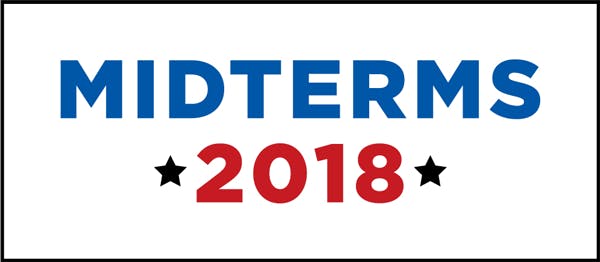Stumping for Georgia gubernatorial candidate Stacey Abrams last week, former President Barack Obama made the case that Tuesday’s midterms were an existential test for the country. The midterms “may be the most important election of our lifetime,” the former president said. “The character of our country is on the ballot.” On Monday, he returned to that message in a series of tweets:
When you vote, you have the power to make it easier for a student to afford college, and harder for a disturbed person to shoot up a classroom. When you vote, you have the power to make sure a family keeps its health insurance.
— Barack Obama (@BarackObama) November 5, 2018
Obama is right—to an extent. Tuesday’s election is the country’s first real opportunity to rebuke a president who has repeatedly abused his office and a party that has deliberately sabotaged the health care of millions, damaged the rule of law, redistributed wealth to the richest Americans, and caused significant damage to long-standing diplomatic relationships. Rejecting Trump and Trumpism, especially given the racist tenor of the GOP’s midterms push, is important, especially at the state level, where Republican governors and legislatures have trampled on voting rights.
While the character of the country may be on the ballot, though, the character of its politics aren’t changing any time soon. Sweeping Democratic victories on Tuesday—especially if the party retakes both chambers of Congress—will lead to positive steps, including overdue House oversight investigations and, if they win the Senate, meaningful checks on the president’s power and influence over both the judiciary and various cabinet positions, particularly the Justice Department. But it will also lead to a fierce counter-reaction from the president and his allies—and a further embrace of racist fear-mongering over issues like the migrant caravan. If Republicans preserve their control of Congress, meanwhile, it would be devastating, leading to the end of the Mueller investigation and perhaps the repeal of Obamacare.
No matter what happens on Tuesday, then, the state of American politics can only get worse.
A blue wave on Tuesday would undoubtedly be a blow to the president and his party. If the Democrats take the House, but not the Senate—the likeliest outcome—they could still do an enormous amount of damage, ensnaring him in investigations into his finances, behavior, and governance for years to come. If they take the Senate as well, they could constrain his power by refusing to confirm judges—as Jeff Flake threatened to do over tariffs—and executive branch appointees.
These would be reasonable, overdue actions. But they will be met with a furious response. If the Democrats take the House and not the Senate, would-be Speaker Nancy Pelosi and Trump will spend the next two years locking horns over subpoena after subpoena. The Senate will respond by acting as a shield, with the same Republican lawmakers who stepped in to protect Brett Kavanaugh—Chuck Grassley, John Cornyn, and Lindsey Graham—doing their best to distract from or downplay his scandals. This particular dynamic likely wouldn’t change even if Democrats prevail take the Senate.
Theoretically, divided government could lead to compromise, since Trump would need Democrats to pass legislation. With 2020 approaching, the thinking goes, he would be incentivized to make deals that show that he can get things done (on infrastructure, for instance). But Trump has shown no interest in this kind of politics. Yes, he has flirted with bipartisanship in the past, but has always ultimately demurred, either due to pressure from aides and donors or from a preternatural devotion to his base. When pressed, Trump has eschewed dealmaking and calls for unity and doubled down on attacks on the media and his Democratic opposition.
Over the last two years, despite controlling Washington, Republicans have done little with their power. Their only major legislative achievement was the $1.5 trillion tax cut, largely benefiting corporations and the wealthy, which appears to represent the entirety of the party’s ideas. The GOP’s policy apathy has become apparent over the last two months, as candidates across the country have embraced the president’s ethno-nationalism and racist immigration policy. With defeat looming, the GOP sees fear-mongering as the only way to get their aging white base to the polls—a strategy that worked two years ago. Expect Republicans to employ these tactics even in defeat.
In fact, they may employ them especially if they lose. The most likely Republicans to lose in Tuesday’s midterms are the most moderate members of Congress, those in suburban districts won by Hillary Clinton in 2016. “That means that your ordinary Freedom Caucus member is going to get reelected even in a blue wave, while the vulnerable members are the more moderate ones who represent swing districts,” Paul Waldman wrote in The Washington Post on Monday. “This will produce a somewhat ironic result in the next Congress: The bigger the blue wave, the more conservative the Republican caucus will end up being when it’s over, and the less equipped the GOP will be to run a different kind of campaign in 2020.”
The GOP’s embrace of a migrant caravan that is hundreds of miles away is instructive. The caravan poses no national security risk, but Republicans and their allies have made all kinds of wild insinuations, suggesting it is full of gang members, terrorists, and lepers. Though some Republicans worry that the caravan will cost the party voters, thus far it appears to be a successful get-out-the-vote strategy as well as a distraction from more pressing issues that don’t reflect well on the president (from Saudi Arabia’s carnage to yet more administration scandals). As the walls close in on Trump, the racist appeals will only increase.
This is true even with the best possible scenario on Tuesday, in which Democrats win both chambers of Congress. If Republicans were to remain fully in power, the result would be infinitely worse. While it’s unclear how much the GOP could do with a narrow majority, it would be a major blow to Obamacare, sensible immigration policy, and the Russia investigation. A victory in Trump’s first midterms, in defiance of historical patterns, would also validate the party’s devotion to racially charged appeals and voter suppression, and they would double down on both.
Republicans opened the Pandora’s Box that led to Trump’s presidency years ago. They have become, as the midterm campaign has made clear, a party whose core identity is based around xenophobia and white grievance. Democratic victories on Tuesday may set in motion the end of Trump’s presidency; they would certainly provide a level of oversight that has been sorely lacking for the past two years. And the Republicans would respond by heeding their worst instincts. What happens in 2020 is anyone’s guess, but the final scene of Reservoir Dogs comes to mind.

